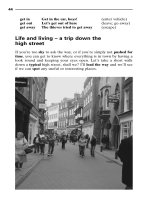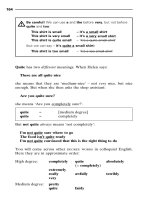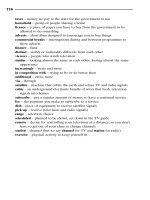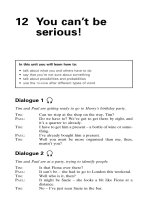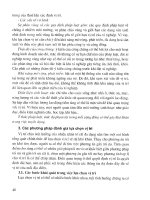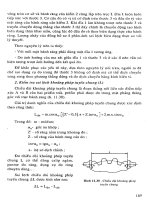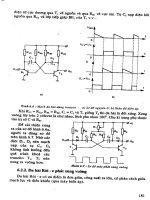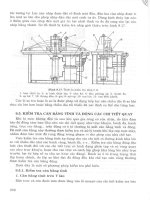English Grammar Course - part 7 doc
Bạn đang xem bản rút gọn của tài liệu. Xem và tải ngay bản đầy đủ của tài liệu tại đây (745.08 KB, 46 trang )
E_English Grammar Course
E_English Grammar Course
Chapter VII
The Simple Sentence
1. Clause Patterns
2. Sentence Elements and their Meanings
3. Concord
4. Negation
5. Questions, Commands, Exclamations
Issues
Issues
Clause Types
Clause Types
1
Clause types
Clause types
Clause Elements
Clause Elements
Obligatory vs. Optional
Obligatory vs. Optional
Clause types
Clause types
Clause types transformed
1/1
See more in 7.1 - 7.8
Clause Types
Clause Types
1
Clause types
Clause types
Clause Elements
Clause Elements
Obligatory vs. Optional
Obligatory vs. Optional
Clause types
Clause types
S, V, O, C, A
They appointed him head of office last week.
S V O C A
Clause types transformed
Clause types transformed
2/1
Clause Types
Clause Types
1
Clause types
Clause types
Clause Elements
Clause Elements
Obligatory vs. Optional
Obligatory vs. Optional
Clause types
Clause types
Clause types transformed
Clause types transformed
Obligatory clause elements are those which are required
for the complementation of the verb.
3/1
Clause Types
Clause Types
1
Clause types
Clause types
Clause Elements
Clause Elements
Obligatory vs. Optional
Obligatory vs. Optional
Clause types
Clause types
Clause types transformed
Clause types transformed
I put the book on the table (SVOA) vs. I put the book.
He resembled his father (SVO) vs. He resembled.
(Sometimes) she sings (beautifully).
4/1
Clause Types
Clause Types
1
Clause types
Clause types
Clause Elements
Clause Elements
Obligatory vs. Optional
Obligatory vs. Optional
7 Clause types
7 Clause types
Clause types transformed
Clause types transformed
1. SVA Mary is in the house.
2. SVC Mary is kind.
3. SVO Somebody caught the ball.
4. SVOA I put the vase on the table.
5. SVOC She has proved it wrong.
6. SVOO Mom buys me a new bike.
7. SV The lady smiled.
5/1
Clause Types
Clause Types
1
Clause types
Clause types
Clause Elements
Clause Elements
Obligatory vs. Optional
Obligatory vs. Optional
7 Clause types
7 Clause types
Clause types transformed
Clause types transformed
Passive transformation
SV, SVC, SVA equivalents
6/1
Clause Types
Clause Types
1
Clause types
Clause types
Clause Elements
Clause Elements
Obligatory vs. Optional
Obligatory vs. Optional
7 Clause types
7 Clause types
Clause types transformed
Clause types transformed
Passive transformation
Many critics disliked the play.
(SVOd)
The play was disliked by many critics.
(S + Vpass + [A])
7/1
Clause Types
Clause Types
1
Clause types
Clause types
Clause Elements
Clause Elements
Obligatory vs. Optional
Obligatory vs. Optional
7 Clause types
7 Clause types
Clause types transformed
Clause types transformed
Passive transformation
Mom considered him a genius.
(SVOC)
He was considered a genius (by Mom).
(SVC [A])
7/1
Clause Types
Clause Types
1
Clause types
Clause types
Clause Elements
Clause Elements
Obligatory vs. Optional
Obligatory vs. Optional
7 Clause types
7 Clause types
Clause types transformed
Clause types transformed
SV, SVC, SVA equivalents
1. SV SVC
The baby is sleeping The baby is asleep
2. SVC SVA
He is jobless He is without a job.
8/1
Let's check
Let's check
1
Which clause type does each of the following
sentences belong to?
1. He’s getting angry.
2. He got through the window.
3. He’ll get a surprise.
4. He got his shoes and socks wet.
5. He got himself into trouble.
6. He got her a splendid present.
9/1
Let's check
Let's check
1
1. SVC He’s getting angry.
2. SVA He got through the window.
3. SVO He’ll get a surprise.
4. SVOC He got his shoes and socks wet.
5. SVOA He got himself into trouble.
6. SVOO He got her a splendid present.
One verb can belong to a number of different classes.
10/1
Sentence elements and their meanings
Sentence elements and their meanings
2
Semantic Roles of the Subject
agentive
recipient
affected
instrumental
locative
temporal
eventive
Empty It
1/2
See more in 7.9 - 7.13
Sentence elements and their meanings
Sentence elements and their meanings
2
Semantic Roles of the Subject
agentive
recipient
affected
instrumental
locative
temporal
eventive
IT
She opened the door.
2/2
Sentence elements and their meanings
Sentence elements and their meanings
2
Semantic Roles of the Subject
agentive
recipient
affected
instrumental
locative
temporal
eventive
IT
This key can open the door.
3/2
Sentence elements and their meanings
Sentence elements and their meanings
2
Semantic Roles of the Subject
agentive
recipient
affected
instrumental
locative
temporal
eventive
IT
The door opens.
4/2
Sentence elements and their meanings
Sentence elements and their meanings
2
Semantic Roles of the Subject
agentive
recipient
affected
instrumental
locative
temporal
eventive
IT
She has a new shirt.
5/2
Sentence elements and their meanings
Sentence elements and their meanings
2
Semantic Roles of the Subject
agentive
recipient
affected
instrumental
locative
temporal
eventive
IT
This room accommodates 20 people.
6/2
Sentence elements and their meanings
Sentence elements and their meanings
2
Semantic Roles of the Subject
agentive
recipient
affected
instrumental
locative
temporal
eventive
IT
Tomorrow is my birthday.
7/2
Sentence elements and their meanings
Sentence elements and their meanings
2
Semantic Roles of the Subject
agentive
recipient
affected
instrumental
locative
temporal
eventive
IT
The meeting ended successfully.
8/2
Sentence elements and their meanings
Sentence elements and their meanings
2
Semantic Roles of the Subject
agentive
recipient
affected
instrumental
locative
temporal
eventive
Empty IT
It’s wonderful to meet you.
9/2
Sentence elements and their meanings
Sentence elements and their meanings
2
We opened the door.
He invented the telephone.
We passed the building.
Semantic Roles of the Object
Od Oi
affected
effected
locative
10/2
See more in 7.14 - 7.16
Sentence elements and their meanings
Sentence elements and their meanings
2
Semantic Roles of the Object
Od Oi
affected
recipient
We paid him a visit.
We gave him some money.
11/2
Sentence elements and their meanings
Sentence elements and their meanings
2
He is tired.
He becomes tired.
Semantic Roles of the complement
Cs Co
Current attribute
Resulting attribute
12/2
